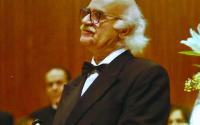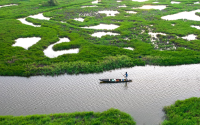14 November 2008
Natasha Gilbert
www.nature.com/news/2008/081114/full/news.2008.1233.html
The changing political landscape, with Barack Obama's win in the US presidential election, and uncertainties over how the economic downturn will play out, have left questions over whether the political will still exists to take action against climate change. Jonathan Lash, former co-chair of President Clinton's Council on Sustainable Development and now president of the World Resources Institute — an influential environmental think tank based in Washington DC — was in London this week. He spoke to Nature News about the possible fall out.Will Obama's election affect the US stance on climate change?
I feel there is 100% certainty that the United States will re-engage with the international community. But there is 0% chance it will ratify the Kyoto protocol — this will not be the basis of climate-change negotiations. The negotiations will be very different now because our emissions have increased so much over the past 20 years and there are different political problems to be dealt with. The world's two biggest emitters are the United States and China. There is a fear of China in the United States. There are concerns that if we regulate and they don't, we will be at a disadvantage.
I hope that early in the Obama administration there will be a bilateral initiative between the United States and China to show their intention to reduce emissions. Obama does things that people say he can't do, so I am optimistic.
Domestically, more than 80% of the votes in the exit polls said the president's economic stimulus package should include green energy. I am sure that there will be a focus on green jobs. People understand this is a positive force for economic stimulation. The harder questions are: do we invest in carbon capture and storage, and do we adopt cap-and-trade legislation?What effect will the economic downturn have on efforts to tackle climate change?
Current political attention is taken up with the banking system and getting people back to work. History has taught us that the economy will bounce back. But nature does not do bailouts.
But I am hopeful. The United Nations' climate-change conference in Copenhagen next year is about looking forwards to after 2012, by which point we will be out of the recession. We are in a totally different time frame now.How can developing countries adapt to climate change?
Increased economic, social and environmental resilience must be part of the response to the risks of climate change. Key to this is community ownership of local resources, such as rivers for fishing. Evidence shows that where people take ownership of resources, they look after them. But communities must also have the capacity to manage ecosystems competently, including the technical and business skills to make them a success. Lastly, communities must have connections to markets and networking opportunities to sustainably grow their nature-based businesses.What is needed to reach a deal at Copenhagen?
Going into the negotiations, an alignment of interests between the United States and China would create the conditions for a deal. Both are dependent on coal and on imported oil.
Not all countries contribute equally to greenhouse-gas emissions and not all have equal capacity to deal with them. The Bali roadmap in 2007 was about expanding discussions to include developing countries, which said they were affected by climate change and wanted to be involved. A deal at Copenhagen also depends on satisfying these regional interests, including deforestation, technology and adaptation. But no one really knows how this will play out or what form this will take.
Coming out of the discussions, above all else we need a process that will lead to reduced emissions and to send a clear signal that we are going to tackle climate change. I don't know if this should take form of binding commitments.






